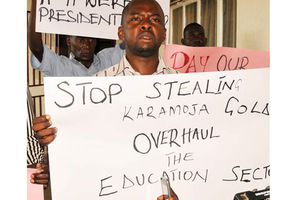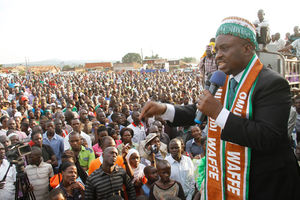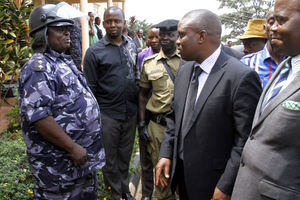
Mzee Ssewanyana during the interview. PHOTO/ANTONIO KALYANGO
Despite the political upheavals the Democratic Party (DP) has endured over the last 70 years, Mzee Henry Bazira Ssewanyana has remained among the key party figures still representing the values of Uganda’s oldest political party.
Nestled in Katooke Village, Kisekka Sub-county in Lwengo District, the 90-year-old welcomes me with a smile to share deep insights into the past and current politics.
Sharing his decorated political journey, Mzee Ssemwanyana recalls a baffling moment that required him to make a heroic decision, which was to reject an offer to become a minister during Gen Tito Okello- Lutwa’s broad-based government and later President Museveni’s first cabinet and opted for rallying people to fight household poverty.
Mzee Ssewanyana, who witnessed the formation of DP in 1954 and joined it the same year, rose through the party ranks to become a political assistant to the party president, the late Paul Kawanga Ssemogerere, and a Member of Parliament for Masaka South-West in present-day Lwengo District ( 1980-1985).
He recounts his period in Parliament as the toughest political experience in his life. “It was very hard, but we had to take that route, entering Parliament as Opposition yet we had defeated Uganda People’s Congress (UPC). Obote stole our victory during the December 10, 1980 elections but we just chose not to shed blood to get political power,” he says.
His accomplishments during his five years as a legislator rotate around legislation, dialoguing and fighting for human rights.
“We were given the office of Leader of the Opposition at Parliament without even a single chair, neither a research assistant nor a staff, I lobbied various embassies and organisations that supported us to furnish the office to where it is today, but those who are there today can’t even trace that history,” he notes.
He adds: “The experience I had gathered over time as a personal assistant in areas of research, lobbying and dialoguing, helped me in enabling my team to shine while basing their debate on well-researched information because tht was my key role as their secretary not as the case now.”
Mzee Ssewanyana also boasts of having spearheaded several pertinent legislations such as the decentralisation policy and a motion that forced the government to launch thorough investigations into mysterious deaths in Rakai District in the 1980s, which were later found to have been a result of HIV/Aids scourge.
Another milestone the veteran politician is proud of was initiating dialogue with the State, a move that saw several political activists and leaders who were abducted on political grounds between 1980 and 1985 rescued from the jaws of ruthless security machinery.
“I did a lot on the floor of Parliament, but the main work I’m really proud of was engaging security operatives on issues of human rights like abductions, a tool the government employed to silence opponents and many were rescued. I can’t recall the many times I engaged the late Paulo Muwanga [Vice President and minister of defence then] and Chris Rwakasisi, the security minister then,” he notes.
He adds that dialogue is a powerful tool that should not be undermined in pursuit of democracy, but it should be done by individuals virtuous enough to front the interests of the wider society.
Referring to the contention among opposition politicians about dialoguing with the government to have the detained supporters of the National Unity Platform (NUP) released, Mzee Ssewanyana believes that it can work. However, he says it can be adopted as a trend by the State of ransoming abductees to weaken the Opposition.
Mzee Ssewanyana was appointed a secretary for the Opposition parliamentary group and later shadow minister of Parliamentary Affairs under Ssemogerere who was the Leader of the Opposition before Parliament was suspended by Gen Tito Okello-Lutwa after overthrowing Milton Obote in 1985.
Upon the dissolution of Parliament following the overthrow of Obote II’s regime by Gen Okello- Lutwa a broad-based government was suggested and DP was invited to take part.
“I was still the coordinator of DP legislators and used to invite them for various meetings, in the process we agreed to join the broad-based government, I also called Mr Yoweri Museveni to leave the bush and join us but he declined, It was a pleasure to hear my name being raised by my party to become a minister but I had already chosen another path,” he reminisces.
Mzee Ssewanyama adds that having witnessed the pitiable living conditions of Ugandans and perturbing poverty levels during his tenure as a legislator, he decided to concentrate on mobilising people towards poverty alleviation.
Even when Mr Museveni took over power, he says he shunned the same proposal of becoming minister, which was fronted by DP leaders.
The hard decision of rejecting a ministerial job, Mzee Ssewanyana says, earned him the office of the executive director of the Foundation for African Development (FAD), a social and economic transformation organisation founded by the late Ssemogerere.
In recognition of his work, Mzee Ssewanyana was elected a member of the European African Committee and Secretary General for Multiparty Parliamentary Democracy at the United Nations, which offered him a platform to empower several Ugandans.
Mzee Ssewanyana says he identified several young people he mentored to become national leaders. He cites Dr Specioza Wandira Kazibwe, the former vice president, whom he spotted while still lecturing at Makerere University.
“She was a unique student in spheres of leadership and I could not let her go, I recommended her for national and international training and conferences and when she was appointed Vice President, I was not surprised,” he says.
Work
Towards retirement from active politics, the DP stalwart founded a local NGO, Kalibbala Rural Development Organisation (KARUDEO) through which women and youth were equipped with agricultural skills and cottage industry management in different parts of Buganda before its deregistration.
Later, he founded Birizita Nalwanga Development Foundation (BNDF) to further his cause and the foundation currently has over members from 50 local organisations.
Background
Moringa, He was born on August 17, 1934, to the late Joseph Kalibbala and Mellania Nanteza of Makondo Village, Lwengo District .
Mzee Ssewanyana attended Kyamaganda Primary School, Kyanukuzi Primary School and Villa Maria Primary School .
He was awarded a scholarship to St Henry’s College ,Kitovu (SHACK). Ssewanyana joined Makerere University for Veterinary studies and after completing his bachelor’s degree, he was awarded a scholarship at Harper Adams University in the United Kingdom where he studied Agriculture Management. When he returned to Uganda, he managed the Makerere University farm in Kabanyolo and at the same time lecturing before joining active politics in 1980.


